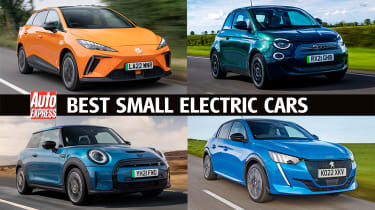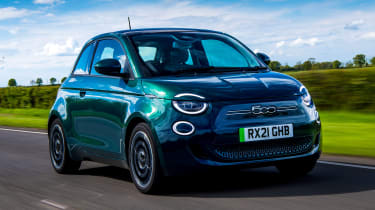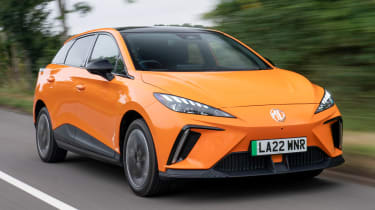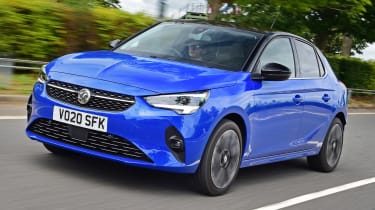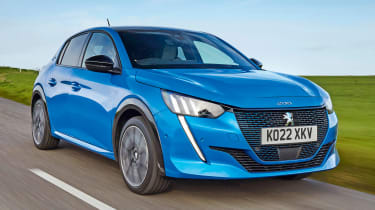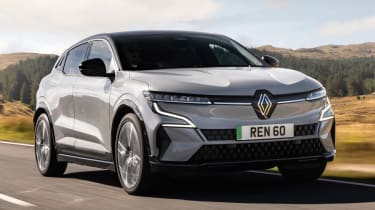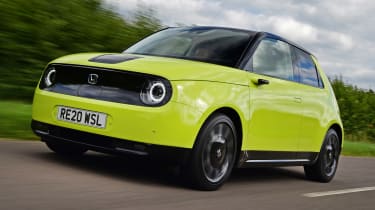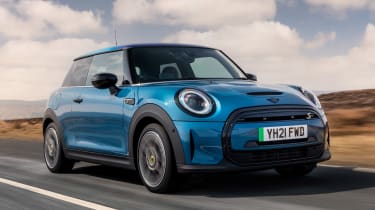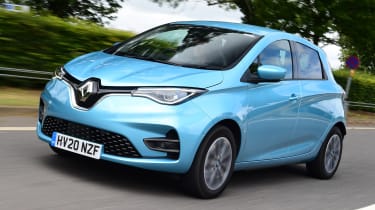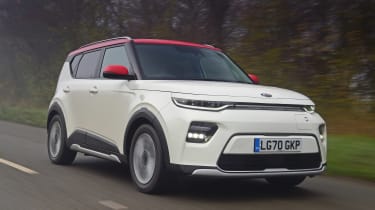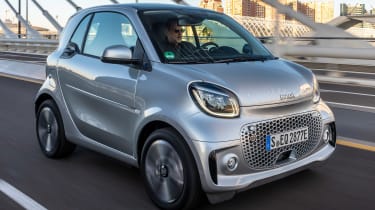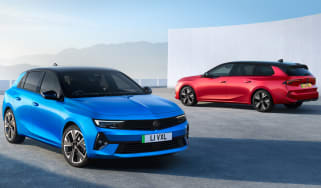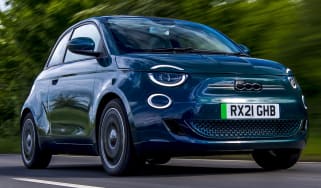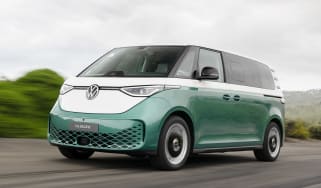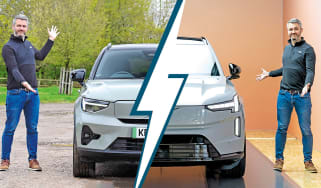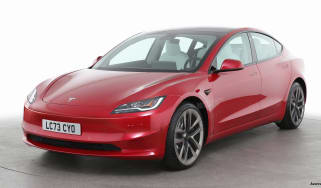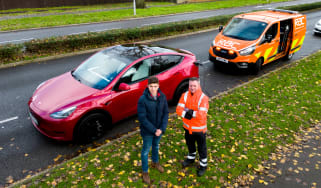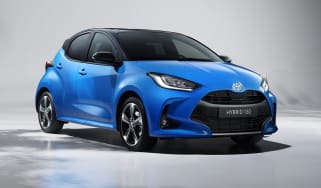Best small electric cars to buy 2023
Small electric cars are gaining ground. Here we pick our affordable favourites...
Small cars are a firm favourite in the UK; they perfectly suit the confines of our tight country roads, as well as the increasingly congested streets in our towns and cities. As carmakers continue to make the switch to EVs, the choice of small electric cars is bigger than ever. These vehicles can be an even better fit with their low running costs and easy driving experience.
Below we’ve lined-up the 10 best small electric cars you can buy right now based on our own exhaustive road tests. All are strong examples of models at the more affordable end of the electric car spectrum, whether you’re buying with cash or on finance.
You could argue that electric cars make most sense when used for short trips in urban areas. Assuming that you have somewhere to charge at home or at a place of work, a small EV with a range of around 200 miles is a fantastic option as a low mileage first or second car. Even if you can’t charge at home, you might only need to find a public charger once a week, maybe less, with the kind of ranges currently on offer.
Beyond that, the brisk acceleration, near silent running and beautifully simple control interfaces make these small electric cars very attractive. Prices can be high but if you’re buying on finance the monthly payments may not be too much greater than for equivalent petrol models.
The best small electric cars to buy now
- Fiat 500
- MG4
- Vauxhall Corsa-e
- Peugeot e-208
- Renault Megane E-Tech
- Honda e
- MINI Electric
- Renault Zoe
- Kia Soul EV
- Smart EQ ForTwo
1. Fiat 500
The best-selling Fiat 500 is now fully-electric. This means that you can now enjoy even lower running costs and zero-emissions while retaining the retro style, nimble driving experience, and general ease of ownership that this long-standing favourite has become a byword for. In fact, we like the latest 500 so much that we named it our City Car of the Year for 2022.
While the 500 is just about capable of handling shorter motorway trips, it’s in the urban environment where this car really shines. It’s easy to park, the steering is light, the ride is comfortable for a car of this class, and you’ll have up to a claimed 194 miles of battery range at your disposal. Rapid charging only takes around 35 minutes from 10-80 per cent, too.
Take a step inside and, no matter which trim level you choose, you will find plenty of up-to-date tech such as a 10.25-inch touchscreen infotainment system and level 2 autonomous driving - This allows the car to adjust acceleration and braking while remaining within its designated lane.
If all this wasn’t enough you can even opt for the 500c, one of very few small electric cars that offers a folding roof.
2. MG4
The modern interpretation of MG hasn’t been in the UK market for very long but the brand is quickly making a solid name for itself when it comes to affordable EVs.
The MG4 is the latest model to go on sale, and with pricing starting from just £25,995 it’s one of the most affordable cars on this list - even if it is also one of the biggest.
It’s more difficult than you might think to find the MG’s cost-saving measures. While some of the materials and finishes are a bit low-rent, there’s an array of pluspoints to make up for that. Standard on-board tech includes a high-res 10.25-inch touchscreen infotainment system with Apple CarPlay and Android Auto, 17-inch alloy wheels, automatic LED headlights, rear parking sensors, and adaptive cruise control.
It’s not just the tech that impresses, either. The MG4 has a single rear-mounted motor with the choice of either a 51kWh or 64kWh battery - for powertrains offering 168bhp or 200bhp respectively. Both models offer a healthy amount of battery range, too, at either 212 miles for the Standard Range or 281 for the Long Range.
3. Vauxhall Corsa-e
The Vauxhall Corsa is one of the UK’s best-selling cars, so the Corsa-e simply takes all of the standard model’s popular qualities and then adds in the benefits of EV ownership - which is definitely a winning combination.
Now that Vauxhall is part of the Stellantis group, the Corsa-e is able to use the same underpinnings as another car in our list, the Peugeot e-208.
The Vauxhall has the same 50kWh battery and 134bhp electric motor as the Peugeot, and a claimed range of 209 miles. Recharge times as low as 30 minutes are also possible, thanks to 100kW DC charging capability.
The Corsa isn’t the most exciting car to drive, but equipping it with electric power boosts its appeal, thanks to the smooth propulsion and refinement it brings. Practicality is also pretty good for a car of this size, with five-doors, enough space in the back for two, and a 267-litre boot.
4. Peugeot e-208
The Vauxhall Corsa-e’s sister car is also based on a petrol-powered sibling. The Peugeot e-208 shares its platform with the 208, and while the small Peugeot may not be as popular as the Corsa, it still offers plenty of appeal.
The e-208 really stands out when it comes to styling, the sharp exterior is eye-catching while the interior takes cues from much larger Peugeot models. It also features decent tech and connectivity.
With 260Nm of torque 0-62mph takes just 8.1 seconds, while the small steering wheel and well set-up chassis means it’s relatively engaging for an EV. Regenerative braking even means you can drive around just using the one pedal for most of the time. The 134bhp motor offers near-silent running and a smooth surge of performance.
Not only is the e-208 rather fun to drive but, unlike many EVs that are based on a combustion-powered car, there’s no drawback in practicality as it offers the same 311 litres of boot space.
5. Renault Megane e-Tech
Renault was something of a pioneer of the electric car, with models such as the Zoe, Fluence, and Twizy going on sale as early as 2012. The Megane e-Tech is the first all-new EV from the French brand for a while, but it's clear that this decade of experience has been put to good use.
The new Megane e-Tech is rather bold in its appearance and will most likely turn some heads with its low height, sloping roofline and SUV design cues. It’s also refined on the road - particularly at motorway speeds - and offers a decent amount of space for family use.
Inside the Megane e-Tech is where things really start to show a positive new direction for Renault. The interior is much classier than some key rivals such as the Volkswagen ID.3. Standard tech includes a nine-inch touchscreen infotainment system with wireless Apple CarPlay and Android Auto, a 12.3-inch digital driver’s display, LED headlights, heated front seats and steering wheel, and a reversing camera.
Admittedly, the Renault’s driving experience isn’t particularly exciting, but the power output should be enough for most everyday needs. The 217bhp motor is capable of a 0-62mph time of 7.5 seconds and a 99mph top speed. A single 60kWh battery is available, and this offers up to a claimed 280 miles of range.
6. Honda e
When Honda revealed the concept for its first European EV, the public really took note, and thankfully the e emerged as a production car without too many changes to the concept’s retro-inspired design.
While the looks are cool and crisp, the tech is thoroughly modern, with 100kW DC charging capability on board. One of the Honda’s party pieces is that its 152bhp electric motor is mounted on the rear axle. This helps packaging but doesn’t compromise room inside the five-door body, so it’s relatively spacious, given its compact dimensions.
It also means that with no motor up front the wheels can turn further; this little EV has a superbly tight turning circle of just 8.6 metres, so it feels right at home on city streets. The infotainment is great, too, with a total of five screens – including one at each side of the dash for the digital wing mirrors.
With a 35.5kWh battery, range is on the more limited side, at 137 miles for both the standard car and the more powerful but more expensive Advance model. However, we’d probably save the cash because the extra power isn’t necessary and the regular car really offers the essence of the e at a more affordable price.
7. MINI Electric
With a range of 145 miles (which is closer to 110 miles from our real-world experience) the MINI Electric is more for short journeys, but it retains the brand’s characteristic driving feel.
That means the handling is sharp, plus the motor’s 270Nm hit of torque makes it quick. The two-mode regenerative braking set-up is strong in the top setting, too, which is great for one-pedal driving.
Subtle styling tweaks include optional 17-inch alloys that look like a plug socket and the fared-in grille, but the MINI Electric only comes in a three-door body.
All MINI Electrics receive the same 32.6kWh battery, while 50kW charging capability means an 80 per cent top-up should take just over half an hour.
8. Renault Zoe
The second-generation Zoe saw Renault’s electric supermini come of age, combining superb real-world range with excellent refinement and driving manners. This all made the Zoe one of our top picks, but a zero-star Euro NCAP safety rating given in late 2021 makes it harder to recommend.
Aside from this, the Zoe has impressive ride comfort for a small EV, and with 239 miles of range, it’s genuinely usable. There’s just one 55kWh battery available and while you do have the option of adding 50kW rapid charging, this comes at an additional cost.
If you’ll mostly be using your car locally (you can recharge it in around 9 and a half hours from a 7.4kW home wallbox) then it might not be worth it. But if you plan to venture further afield in the Zoe – and you’ll be able to, given the range on offer – rapid charging could be a good idea. It drops recharge times to an hour and 10 minutes for a top-up to 80 per cent.
Iconic trim is all you’ll need in the practical, five-door Zoe, because it features lots of strong safety tech, good connectivity and luxuries such as LED headlights and parking sensors.
9. Kia Soul EV
While there’s plenty of excitement about Kia’s new EV6 and Niro EV, the smaller - and slightly older - Kia Soul EV still makes a very good case for itself as a purchase.
This small SUV isn’t just a looker, as there are plenty of features to be found. 17-inch alloy wheels, LED headlights, adaptive smart cruise control, smart entry, a reversing camera, forward collision-avoidance and lane-follow assist all feature as standard.
It’s not just the on-board tech that’s generous, either, as the 64kWh battery pack is capable of up to 280 miles between charges. Rapid charging isn’t the quickest out there, but a 10-80 per cent charge should be completed within an hour.
Reliability should be strong, but for added peace of mind Kia’s seven-year/100,000-mile warranty comes as standard.
10. Smart EQ ForTwo
The Smart EQ ForTwo is an ideal choice if you like your car to stand out from the crowd. Much like the original Smart, the EQ ForTwo is boldly styled and tiny compared to almost any other modern car.
This compact size has some practical uses, too. While it will never be a luggage or family lugger, the EQ ForTwo is a great car for zipping in and around town and has a tighter turning circle than a London Taxi. It’s also very easy to park, even in the smallest of spaces.
Urban driving is really all you will be able to do in the Smart as it has a maximum battery range of just 81 miles. However, if what you seek is an all-electric runaround then the price should be quite tempting at under £22,000. Just like the Fiat 500, the Smart EQ ForTwo is also available as a convertible.
Going electric for the first time?
If you’re looking at buying a small electric car, the chances are it could be your first EV, so you’ll be plunged head-first into a world of unknowns. What is a kWh? How much range do I need? What is rapid charging? Thankfully, we’re here to help.
On those subjects, kWh (kilowatt-hour) is a measure of energy. The more a car’s battery offers, the more energy it can store and the greater the range should be. When it comes to range, the answer really depends on how you might use an electric car. Will it mostly be for short journeys, or will you regularly travel further afield? The answers to these questions could determine what kind of EV you’re in the market for.
When it comes to charging, there are three main types. A 2.3 kilowatt (kW) feed usually means a standard three-pin plug, which will take a while to charge even the smallest battery-electric vehicle. If you’re buying an EV, then you should think about getting a home wallbox installed instead. Many manufacturers are offering free installations with their electric cars as an incentive; these usually supply a feed in the region of 7kW, which will be fine for overnight charging. Most home electricity supplies can support this, but not much more.
Rapid charging uses DC current, unlike the systems we’ve mentioned above that use AC. Rapid chargers use feeds between 40 and 150kW. Think of the kW number as the bore of the hose filling a petrol or diesel car’s tank; the bigger the number, the bigger the hose and the faster the tank (in this case the battery) will be replenished.
For an alternative view, see our sister site DrivingElectric's ranking of the best small electric cars...

